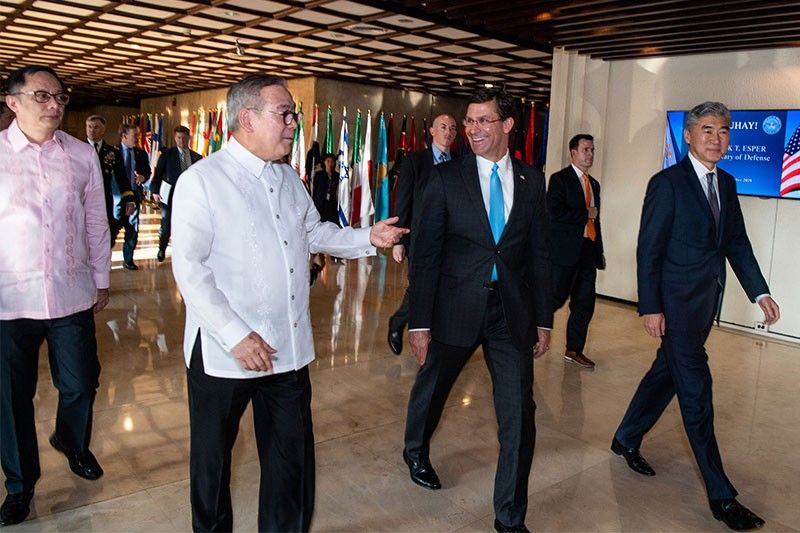February 6, 2020 | 12:53pm
MANILA, Philippines — The Philippines' top diplomat compared the country's Mutual Defense Treaty (MDT) with the United States to a "deflated balloon" without the Visiting Forces Agreement (VFA) and the Enhanced Defense Cooperation Agreement (EDCA).
Foreign Affairs Secretary Teodoro Locsin Jr.'s statement countered Malacañang's previous claims that terminating the VFA would not affect the 1951 MDT with the US.
Despite President Rodrigo Duterte's order to terminate the VFA with the US, Locsin called for a vigorous review of the agreement.
Speaking before the Senate Committee on Foreign Relations, the DFA chief said there would be "no practical use" for an EDCA without the VFA, which is the legal framework for the presence of US military personnel in the Philippines.
EDCA allows US troops an increased rotational presence in the Philippines and the use of designated Philippine military bases.
"The Mutual Defense Treaty without the VFA and EDCA may be compared to a deflated balloon. For all practical purposes, it becomes an extra large rubber for our nation—far more elastic than it can ever need for its purpose and more suitable as a shower cap than a prophylactic against foreign aggression," Locsin told the Senate panel.
The top diplomat also told the Senate panel that the US may see no need to continue with EDCA without the VFA due to the lack of regulations in US military personnel.
A January 31 report by The STAR quotes presidential spokesman and legal councel Salvador Panelo as saying "the other agreements will remain, but I understand the Senate will also be reviewing all the treaties."
DFA chief: Terminating VFA an exercise of sovereignty
While the DFA chief acknowledged that the option for the Philippines to terminate the VFA is an exercise of sovereignty, he also bared the risks of abrogating the agreement.
The VFA has ensured operability of Philippines-US agreements and modalities of defense and security operation and these might be rendered inoperative without the pact.
Locsin also noted that the US has provided a total of $554.55 million worth of security assistance and security cooperation programs from 2016 to 2019 under the VFA.
Under the VFA, the Philippines and the US have also agreed to conduct more than 300 joint activities between military personnel and law enforcement agencies.
"The absence of a VFA would result in a severe curtailment of defense engagements with the Philippines and the cancellation of cooperative defense activities in the Philippines," the top diplomat said.
Aside from military engagements, the VFA also allowed continued support for addressing non-traditional threats such as human trafficking, cyberattacks, terrorism and illegal drugs.
Locsin pointed out that the US has provided support for humanitarian assistance and disaster response in times of typhoons and earthquakes. The US also provided support in the Philippine military's campaign against ISIS-inspired local terrrorists in Marawi in 2017.
Scrapping VFA could 'dilute' US commitment
Noting the previous commitments of US State Secretary Mike Pompeo and US Defense Secretary Mark Esper that any armed attack against Filipino forces in the West Philippine Sea would trigger the MDT, Locsin said the termination of the VFA would likely "dilute" US commitment to the treaty.
"Terminating the VFA would negatively impact the Philippines' defense and security arrangements as well as the overall bilateral relations of the Philippines with the United States and perhaps even on the subregional and multilateral level," Locsin said.
Referring to the US Senate's resolution calling for the release of detained Sen. Leila de Lima, Locsin said American senators have insulted their own justice system which is the model of the Philippine judiciary.
The DFA chief said that there is value in revisiting the VFA to address issues of sovereignty, such as jurisdiction and custody.


































